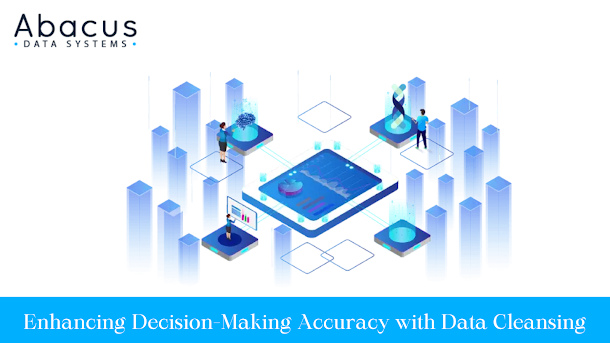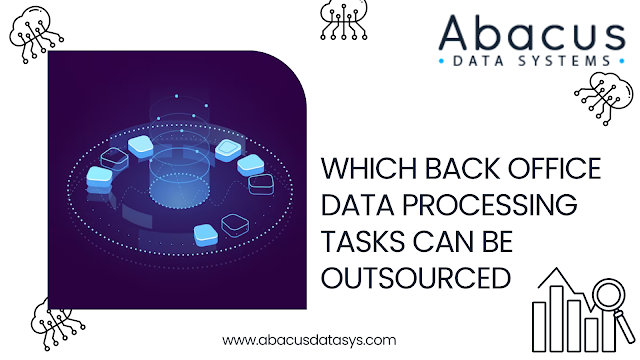Enhancing Decision-Making Accuracy with Data Cleansing
In today’s digital age, data is king. Businesses depend on precise and trustworthy data to make well-informed choices, understand their customers' actions, and enhance their overall performance. Yet, while data analysis and management are vital for refining business operations, dealing with vast amounts of unorganized data can be time-consuming. This is where data cleansing steps onto the scene. Data cleansing involves spotting and fixing errors or inconsistencies in data sets.
The presence of high-quality data has the potential to reshape the overall perspective of any business. Maintaining a clean and junk-free database should be the foremost concern of every company. This is where the vital importance of effective data cleansing services becomes evident. In this blog, we will provide brief details of enhancing decision-making accuracy with data cleansing.
To remain competitive in today's data-centered business environment, numerous companies are adopting data-focused decision-making approaches. These approaches help them pinpoint challenges, seize opportunities, and make timely choices that can influence their financial performance.
What is a Data Cleansing Service?
A data cleansing service involves removing irrelevant and outdated data from your database, as well as organizing and formatting the data. Its purpose is to ensure your business operates smoothly.
Businesses often store important data, including employee information, customer details, and confidential documents. It is the responsibility of organizations to protect sensitive information. Ensuring data protection builds trust with employees, clients, and investors. When you outsource data cleansing services to offshore companies can reduce the risk of inaccurate data at a low cost.
Perils of Inaccurate Data
Inaccurate, duplicate, incomplete, improperly structured, or damaged data can negatively impact business results. It can lead to wrong conclusions, misguided choices, missed chances, and higher expenses.
For instance, making decisions about inventory management based on inaccurate sales data can cause inventory problems and financial losses. Similarly, faulty data for marketing campaigns can result in ineffective targeting and resource wastage.
Furthermore, inaccurate data can create compliance concerns. Various industries have strict rules about how data is collected and used, and not following these rules can lead to significant fines and legal issues.
How to Enhance the Decision-Making Process through a Data-Cleansing Service?
Identifying Errors
Sometimes, data can get corrupted, often due to inaccurate information being added to the database. This can make it challenging to verify the entered data. Regularly monitoring and authenticating data sources is the first step in enhancing data quality. To make smarter business decisions, it's essential to maintain high-quality data, and this starts with ensuring the authenticity of your data sources. This ongoing monitoring and verification will help keep your database free from errors and duplication.
Developing a Data Quality Plan
Reliable data plays a significant role in improving decision-making. To make this a reality, your business should establish a solid data quality plan. Such a plan ensures that your database contains data of high quality at every stage, from collection and verification to categorization. What are the benefits of having a data quality plan for your business as part of the data cleansing service?
Ensures the use of precise and credible business data
Provides accurate information to authorized personnel on time
Facilitates flawless data interpretation
Reduces costs and eliminates compliance issues
Simplifies data transfer and integration
Improves data collection and reporting
Validating Data Sets
Validation is a crucial step in the data cleansing service, addressing issues like inaccuracy and duplication. Data cleansing companies ensure a successful validation process that produces valid, powerful, consistent, credible, and unique results. Depending on maximizing data quality, the time required for data scrubbing services may vary. Using the right tools and technologies can expedite the data validation process.
Clean Data – The Key to Making Smarter Decisions
Cleaning data is crucial for businesses to ensure that their information is accurate, relevant, and up-to-date, leading to improved decision-making and better business outcomes.
Here is why clean data is the key to making smarter decisions.
Supports Data Analytics
Data cleansing uses advanced methods to find and fix errors, making data accurate and standardized. Unclean data not only affects data accuracy but also hinders employee satisfaction and productivity. Analyzing messy data can be a drag, but data cleaning automates these tasks, speeding up business processes. With accurate, complete data, businesses can use data analytics, make informed decisions, and prevent costly errors. This enhances productivity, revenue, and employee engagement.
Saves Resources
Data cleansing eliminates duplicate, outdated, and incorrect data, saving storage space, computing power, and network bandwidth. Duplicate records can waste resources and lead to inaccurate analysis. Data cleaning helps reduce redundancy and maintain a single, accurate view of data entities, preventing resource waste.
Data Validation and Verification
Data cleansing conducts thorough checks to ensure data integrity, reducing the risk of errors in business processes and decision-making.
Standardization and Formatting
Data cleansing companies follow industry rules to standardize and format data, ensuring consistency in structure, naming, units, and other aspects. Well-formatted data makes analysis, reporting, and system integration more efficient.
Data Enrichment
Cleaning data also involves adding relevant information to enrich datasets, such as demographic details or social media profiles. This helps businesses gain deeper insights, improve segmentation, and personalize customer experiences.
How Data Cleansing Supports Different Industries
Here are three examples of how data cleansing is used in various industries:
Retail and E-commerce
In the world of online shopping, a big retailer may have a huge customer database with duplicate entries, addresses that are not complete, and contact information that doesn't match. Data cleaning techniques can be used to find and combine duplicate customer records, fix address issues, and make sure contact details are correct. This leads to accurate customer profiles, better-targeted marketing, and improved order processing.
Healthcare
Healthcare organizations deal with many patient data, like medical records, insurance details, and demographics. Cleaning up the data is important to remove duplicate patient records, correct medical codes that are inconsistent or wrong, and ensure data is consistent across different systems. Clean and dependable data improves patient care, makes billing and claims processing accurate, and supports effective medical research.
Financial Services
Banks and financial institutions handle customer data, including account information, transaction records, and personal information. Data cleaning helps find and fix errors in transaction data, standardize account codes and formats, and check customer information. Clean data ensures accurate financial reporting better fraud detection, and enables personalized financial services.
Partner with Professionals for Data Cleansing Services
The primary goal of every business organization is to validate data and make well-informed decisions. In addition to facilitating real-time decision-making, the data cleansing service improves data quality, security, storage, and other business operations. When handling a large volume of data regularly, you can outsource data cleansing services, which is a better choice. This approach ensures customizable results that align with your specific business requirements.



Comments
Post a Comment